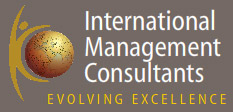


Poonam Datta | Founder & CEO
Post graduate in Marketing & Business Management, and with over 25 years of diversified experience with renowned multinationals. IMC is a vision that evolved from her knowledge of how individuals play a key role in business successes.
See Portfolio
In a fast paced world, continuous learning is essential to success.
Individuals need to learn to succeed in life and at work. Companies need to
ensure their employees continue to learn, so they can keep up with increased job
demands, and so the company can gain or maintain competitive advantage.
This site provides resources, ideas, strategies, etc to help those involved in
the training and development profession help meet the learning needs of the
organization through the use of training techniques, facilitation, and
development activities.
Enhancing business performance through corporate coaching
Wherever you are reading this, stop and ask yourself "in a business context what
are the things I value most?" Notice what pops up. Then ask yourself "how do I
ensure that I get what I need and value most" and "how does what I value get
replenished, nurtured and kept at peak performance?"
Staying resourceful, purposeful and motivated is key to top performance. All my
experience shows the on-going development of human potential is critical to
business success. Ask any successful executive whether it would be helpful to be
in a more resourceful state when making key decisions and the answer is always a
resounding yes!
The difference that makes the difference: incremental performance
In today's fast moving and complex global world, coaching is increasingly the
vehicle by which it becomes possible to get incremental performance out of top
people. It's like servicing a car. Top performance results from properly focused
attention and investment.
Executive and performance coaching is no longer just the preserve of those who
have a seat at the boardroom table or are in the echelons of senior management.
More and more companies are turning to coaching to complement the overall
development of the individual. After all, it's individuals that create
excellence. This approach allows space for conventional technical skill based
training as well as a focus on individual issues that enhance performance. And
the payoffs are significant.
Frequently I find myself asked about what corporate coaching is and how it helps
organisations. So, let's get clear about what we're talking about before looking
at why some companies are taking executive coaching even further and adopting it
as a corporate management style.
What is corporate coaching?
Corporate coaching is about shifting the workplace horizon from one where people
receive direction from others to one where people commit to doing things they
care passionately about. The process encourages the development of personal
leadership and responsibility throughout the organisation.
How does coaching help organisations?
Organisations are made up of individuals. Coaching is a collaborative process
focusing on the developmental of the individual. It involves a relationship
rooted in mutual respect and rapport. It is anchored in constructive, respectful
language and endorses rather than diminishes people's skills and abilities. It
assists individuals and teams to focus on possibilities and eliminate
limitations. It helps people overcome obstacles to their success, including
their attitudes, beliefs and behaviours. Perhaps even more importantly it
provides a model for giving and receiving constructive feedback.
How does coaching as a management style affect corporate culture?
The results are astounding. Often old directive styles of management give way to
a more coaching and commitment based culture. Hierarchy soon gives way to
support, blame gives way to honest evaluation, external motivators are replaced
by self-motivation, protective barriers fall as teams build, change is no longer
feared but welcomed and satisfying the boss becomes pleasing the customer.
Indeed coaching as a management style focuses on the future, on what is
possible, encouraging multi-level decision-making and evolutionary learning.
What emerges is an organisational culture defined by commitment, one in which
creativity and innovation is encouraged. Leaders support, inform and influence,
resulting in performance being measured against shared goals with strong
personal commitment by organisational members. In summary, the culture
encourages greater flexibility and adaptability to change - a key corporate
attribute in today's environment.
What are the benefits of corporate coaching?
Applicable in all areas of the business, both with individuals and teams,
coaching uses common language everyone can relate to. It places emphasis on the
unique potential of individuals to maximise their own performance, putting focus
around future possibilities. As such, it fosters entrepreneurial thinking,
develops flexibility and gains commitment to individual development. It also
greatly enhances communication with internal and external customers, often
transforming relationships. All this contributes towards building a common
platform for organisational evolution and a strong corporate culture.